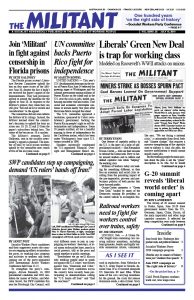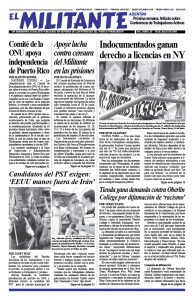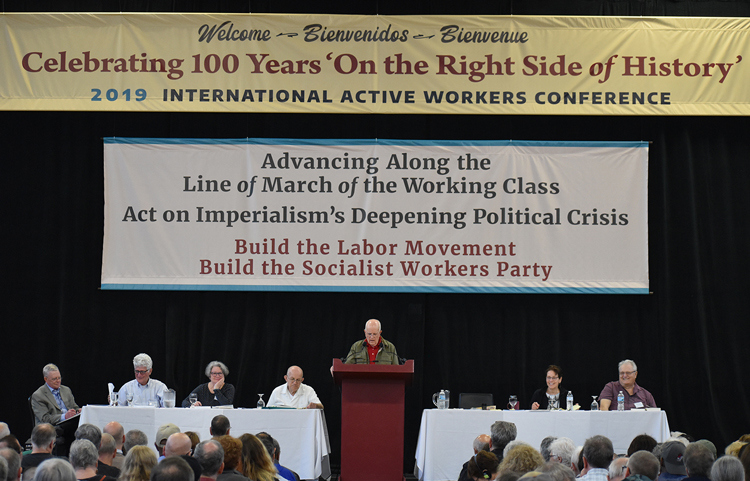“We’ll come out of this conference campaigning all across the country,” Jack Barnes, Socialist Workers Party National Secretary, said at the close of the party-sponsored International Active Workers Conference held in Oberlin, Ohio, June 13-15. He pointed to opportunities today to use the party’s 2019 and 2020 election campaigns to spread the reach of its program and activity among working people in cities, towns and rural areas and to recruit new members.
Remember, Barnes said, “recruit” is an active verb. It’s something we do, not something we wait for workers and youth attracted to the party to do. The SWP is a little bigger this year, he added, and so is the conference.
“Celebrating 100 Years ‘On the Right Side of History,’” read the 20-foot-long banner above the stage. The conference marked the Socialist Workers Party’s centurylong continuity from the founding of the Communist Party in the U.S. in 1919. That anniversary banner was followed by another:
“Advancing along the Line of March of the Working Class
“Act on Imperialism’s Deepening Political Crisis
“Build the Labor Movement
“Build the Socialist Workers Party.”
As working people face the grinding effects of the capitalist rulers’ economic, political and moral crisis and their wars abroad, SWP candidates and campaign supporters call for independent working-class political action, Barnes said. They point to the necessity for working people to break with the bosses’ government and state, as well as their twin parties, the Democrats and Republicans.
To give a boost to these working-class campaigns, the party’s National Committee, meeting right after the conference, put two SWP spokespersons on the road — Alyson Kennedy, its 2016 presidential nominee and mayoral candidate in Dallas earlier this year, and Malcolm Jarrett, the party’s candidate for Pittsburgh City Council. Equipped with books on revolutionary politics, the Militant newsweekly, and election flyers, they’ll join with campaign supporters across the U.S. to get out the party’s program at working people’s doorsteps and in the course of union and other social and political activity. (See article on front page.)
A working-class line of march
Workers need to build our own political party, Barnes said, a party based in the working class and unions. A party with the aim of organizing and mobilizing workers and our allies to establish a workers and farmers government.
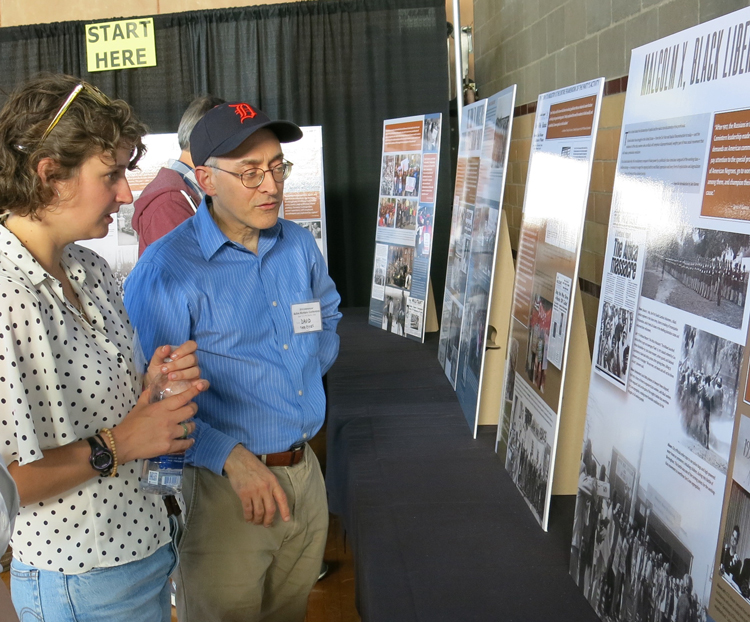
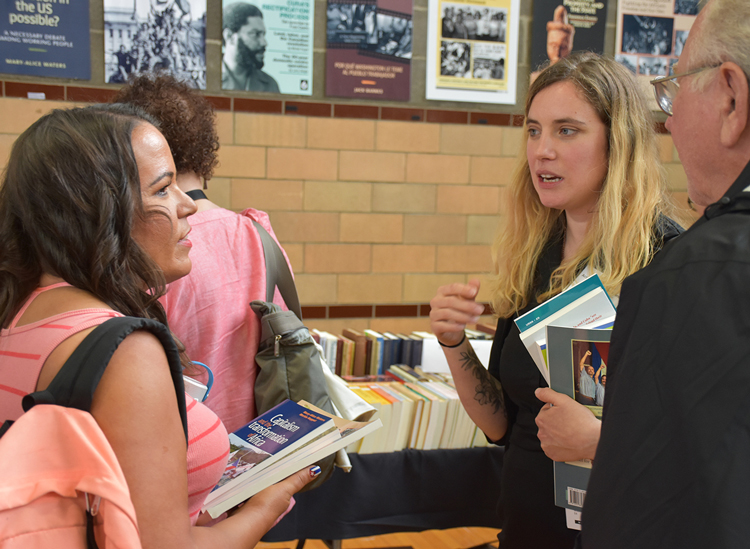
It was with that goal in mind that revolutionary-minded working people in the U.S. 100 years ago founded a new party to follow the example set by workers and peasants in Russia, who in October 1917 carried out the Bolshevik Revolution. For the first time in history, they established state power by the working class.
Some 30 conference displays graphically illustrated the SWP’s continuity in program and in action — from its birth as part of the Communist International in 1919, to the political developments and class battles that forged the party since. Especially significant was the triumph of the Cuban Revolution in 1959. The victory of the Cuban toilers and advance of their socialist revolution, led by Fidel Castro and the July 26 Movement, Barnes said, helped win many current party leaders to the SWP and to the international movement to end class exploitation and oppression once and for all.
The capitalist rulers and their enablers in the professional and privileged middle classes try to convince working people we can’t be more than the objects of history. They tell us we’re better off submitting to rule by the “smarts” who know what’s best for us. But in the course of working-class struggle, Barnes said, we transform ourselves into the makers of history — and take our destiny into our own hands.
Class independence v. Democrats
The packed three-day conference featured two reports; a number of classes and discussion sessions; a panel on the party’s work in the labor movement and on the job, and another on SWP election campaigns; and a closing session to summarize the party’s perspectives and activity.
In his political report, “100 Years ‘On the Right Side of History,’” Barnes said that the SWP is the only party in the U.S. whose continuity as communists is unbroken. Other groups once claiming that continuity to the Bolsheviks tossed it aside — in deeds long ago, but more recently in words as well. Some, like the International Socialist Organization, have imploded and dissolved, with many ISO leaders and members going into the Democratic Party. Other organizations are well along the way.
The largest group calling itself socialist, the Democratic Socialists of America, never claimed a connection with communism or independent working-class political action. It traces its continuity to the late 1950s and striving to make real, in its own words, DSA founder “Michael Harrington’s vision of building a strong coalition among progressive trade unionists, civil rights and feminist activists and the ‘new politics’ left-liberals” in the Democratic Party.
These socialist Democrats are apparatchiks in the main party of U.S. imperialism. “We are a political and activist organization, not a party,” DSA says on its website. They’re fighting for a strong centralized state, so working people can “run both the economy and society democratically to meet human needs.”
But the state in the USA is — and can only be, short of the working class establishing its own power — a capitalist state. The course of the socialist Democrats, in fact, is one of mobilizing the U.S. population on a war footing to keep the working class at heel and preserve the power and reach of U.S. imperialism.
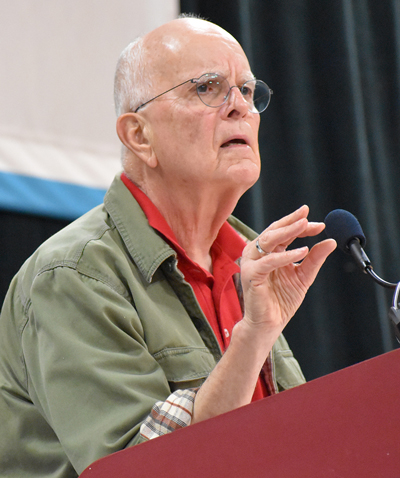
Nowhere is this clearer, Barnes said, than in the “Green New Deal” proposed by DSA member and Democratic Representative from New York Alexandria Ocasio-Cortez and other Democrats. Claiming that imminent climate disaster and today’s jobs crisis require drastic action, she argues, as she did at an MSNBC “town hall” in March: “We’ve been here before with World War II, even the Cold War. And the answer has been an ambitious and directed mobilization of the American economy to direct and solve our problem, our biggest problem.”
The hero and model of the “Green New Deal” is Franklin Delano Roosevelt, who proposed what he called the New Deal to try to corral and defuse the mighty rise of labor in the 1930s, which posed a threat to capitalist rule. But as today’s backers of its hoped-for reincarnation admit, the New Deal only succeeded as it grew into the War Deal in the 1940s.
And, as Barnes explained and the Democrats do their best to cover over, that, in turn, led to “the FBI Deal”— the indictment and imprisonment of leaders of the Socialist Workers Party and Midwest Teamster leaders for their campaign in the labor movement to oppose U.S. government war aims and measures to hogtie the unions in the name of national unity.
The DSA’s orientation in the Democratic Party is a deadly threat to the working class, Barnes said.
The SWP’s class course is the polar opposite — to build the unions and root itself in the working class. To advance an independent working-class political course to replace the rule of the propertied families with a workers and farmers government — as the party’s forebears led working people in doing in Russia and Cuba.
Proletarian orientation
Strengthening the leadership of the SWP’s work in the unions was a focus of the June gathering, as well as the party leadership meeting afterwards to implement conference perspectives.
The SWP made a turn to industry and the industrial unions in the mid-1970s in response to resistance by workers to the opening shots of today’s deepening world capitalist crisis. Drawing on experiences and lessons since the party’s founding, the turn was decisive to keeping it on a proletarian course.
Members of the SWP’s trade union fractions are “always looking for openings to win other workers to join them visiting picket lines and at social protest actions,” said Mary Martin, a leader of the party’s union work, during the panel entitled, “Tribunes of the People and the Turn to Industry.”
“And we also carry out propaganda activity, selling the Militant and books by revolutionary leaders to co-workers, widening interest in the party’s program and campaigns.”
Kaitlin Estill, 27, from Oakland, California, who was at her first conference, told the Militant she got a lot out of the panel. “I want to use my capacities to be part of this fight,” she said. Estill joined the SWP after returning from this year’s May Day Brigade to Cuba and said she plans on joining one of the party’s trade union fractions. At its post-conference meeting, the SWP National Committee voted to organize a candidate for membership program to help involve new members in party activity and advance their political education.
The conference panel “Our Election Campaigns Lead the Party Outward,” was organized and chaired by SWP National Campaign Director John Studer. Party candidates described how they use the party’s program as they and their campaign supporters talk with other working people about the political questions we confront today. That includes explaining demands for a single union for yellow cab, Uber, and other drivers; the fight for workers control of production in face of bosses’ disregard for life and limb in their drive for profits; and an amnesty for undocumented immigrants to strengthen the fight to organize all workers into unions and overcome divisions sown by the employers.
During this year’s Dallas mayoral campaign, said panelist Alyson Kennedy, she and other SWP members there responded to a failed Washington-backed coup in Venezuela by organizing and building a street protest demanding “U.S. hands off Venezuela and Cuba!” Today, she said, we need to be ready to do the same demanding “U.S. hands off Iran!”
Fight for women’s emancipation
SWP leader Mary-Alice Waters gave a well-attended class on “Communist Continuity and the Fight for Women’s Emancipation.” Pointing to the historic working-class course in this struggle, she quoted Frederick Engels, a founder of the communist movement. “True equality between men and women can become a reality,” Engels wrote, “only when the exploitation of both by capital has been abolished and private work in the home has been transformed into a public industry.”
Many conference participants had recently joined tens of thousands at protests across the U.S. determined to defend abortion rights in face of mounting government assaults. “Our demand for family planning, including the right of women to choose abortion is unconditional,” Waters said. She contrasted the party’s decadeslong record in this fight to the stance of middle-class meritocratic layers, who disdain working people with large families and advocate forms of population control.
For many women the decision whether or not to have an abortion is complex, Waters said. A medical procedure is nobody’s first choice as a form of birth control. Every abortion is the result of conditions forced on women by capitalism — lack of easy and affordable access to contraception, to family planning programs, to adequate and available medical care.
As part of building the labor movement and advancing the struggle for socialism, Waters said, the SWP actively joins in the needed discussion and debate, explaining why access to family planning, including abortion rights, is a precondition to the fight to end women’s second-class status under capitalism.
Act on imperialism’s deepening crisis
In his conference presentation “The Middle East and the Jewish Question: Acting on the Communist Program,” SWP National Committee member Steve Clark said that at times of deepening economic and social crisis, the rulers foment Jew-hatred with deadly results — genocidal results, in fact, fewer than 80 years ago. A course to advance working-class interests cannot be charted, he said, without defending the right of Israel to exist and the right of Jews to seek refuge there.
Clark pointed to statements by Cuban revolutionary leader Fidel Castro in 2010, highlighting the unique character of Jew-hatred. “I don’t think anyone has been slandered more than the Jews,” Castro said, adding, “There is nothing that compares to the Holocaust.”
Clark urged conference participants to study the party’s statement “For Recognition of a Palestinian State and of Israel” and use it widely with workers and youth they meet in the U.S. and the world over.
He also addressed the U.S. rulers’ brutal sanctions bearing down on working people in Iran, as well as Washington’s war threats in recent months. “We have to be ready to act decisively to mobilize opposition if U.S. military action of any kind is taken against Iran,” Clark said.
Other conference classes included “Proletarian Revolution and Materialism: Science vs. Anti-science Is a Class Question;” “The Worker-Farmer Alliance and Our Communist Program;” “Black Liberation and the Road to Workers Power: What We Learned from the Bolsheviks and the Comintern;” and “The Communist Course and Leadership of Thomas Sankara.”
The day after the conference, party supporters met to discuss the next steps in their work — organizing all aspects of the printing and distribution of Pathfinder books by party leaders and other revolutionaries.
In response to an appeal at the conference, participants contributed $42,947 to a Summer 2019 Party-Building Appeal that runs through July 26. If you’d like to kick in, send a check made out to the SWP to 306 W. 37th Street, 13th Floor, New York, NY 10018.
